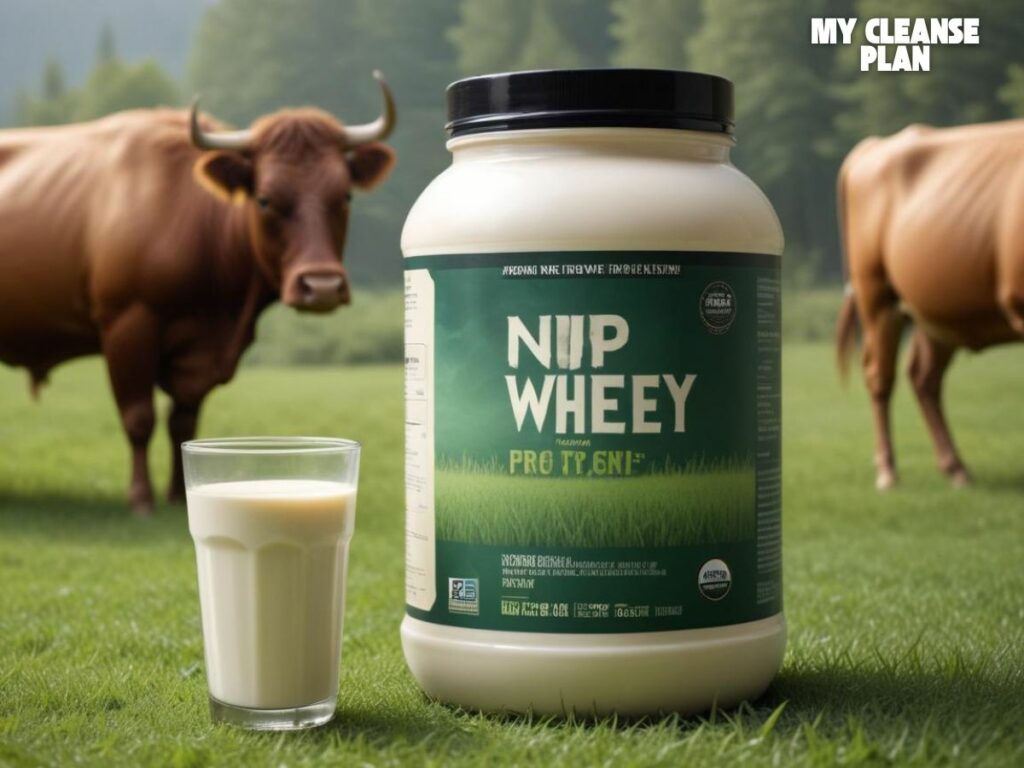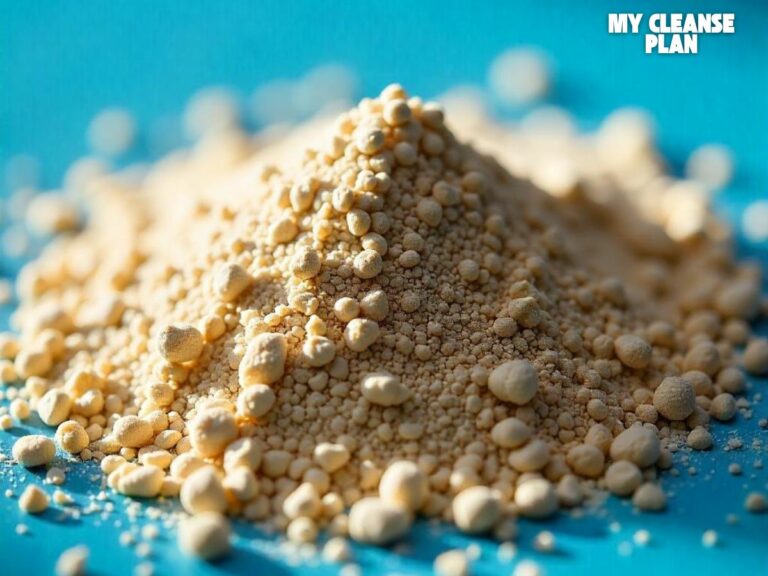Is Grass Fed Whey Protein Good for You?
Grass-fed whey protein is a top choice for those seeking high-quality nutrition. Sourced from pasture-raised cows, it’s rich in protein, omega-3 fatty acids, vitamins, and minerals.
Minimally processed, it retains its natural health benefits, offering a complete amino acid profile that supports muscle growth and overall well-being.
For health-conscious individuals who value ethical sourcing, grass-fed whey protein is a nutrient-dense and effective way to meet daily protein needs.
This article will help explore you that is grass fed whey protein good for you or not?

Key Takeaways
Expert Guide
Is Grass Fed Whey Protein Good For You? Health Benefits of Grass-Fed Whey Protein
Here’s a detailed explanation of Improved Digestibility for grass-fed whey protein:
Lower Lactose Content
- Reduction in Lactose: Grass-fed whey protein often contains less lactose compared to conventional whey protein. This is due to the natural diet of grass-fed cows, which can influence the composition of the milk they produce.
- Lactose Intolerance Friendly: For individuals who are lactose intolerant or sensitive, this lower lactose content can result in fewer digestive issues such as bloating, gas, and discomfort.
Fewer Additives and Artificial Ingredients
- Minimal Processing: Grass-fed whey protein is typically less processed and contains fewer additives compared to conventional whey protein. This minimal processing helps maintain the protein’s natural structure, which can be easier for the body to digest.
- Natural Ingredients: The absence of artificial sweeteners, flavorings, and preservatives in grass-fed whey protein helps reduce the likelihood of digestive disturbances.

Better Protein Absorption
- Bioavailability: Grass-fed whey protein is often praised for its high bioavailability, meaning it is efficiently absorbed and utilized by the body. This can enhance overall nutrient absorption and support better digestive health.
- High-Quality Protein Structure: The natural composition of grass-fed whey protein supports better digestion and utilization of amino acids, which can improve overall protein metabolism.
Support for Gut Health
- Presence of Immunoglobulins and Lactoferrin: Grass-fed whey protein contains higher levels of beneficial components like immunoglobulins and lactoferrin, which can support a healthy gut microbiome and improve digestive function.
- Less Inflammation: The natural composition of grass-fed whey protein may contribute to reduced inflammation in the gut, further supporting digestive comfort.
Comparing Grass-Fed Whey to Other Protein Sources
Here’s a table comparing Grass-Fed Whey Protein to other protein sources, including Whey Protein Concentrate vs. Isolate, Plant-Based Proteins, and Casein Protein:

| Comparison Factor | Grass-Fed Whey Protein | Whey Protein Concentrate | Whey Protein Isolate | Plant-Based Proteins | Casein Protein |
|---|---|---|---|---|---|
| Protein Content | High, with a complete amino acid profile | Lower protein content (70-80%) | Higher protein content (90% or more) | Varies, typically lower than whey | High, slow-digesting protein |
| Fat and Carbohydrate Content | Contains some fats and carbs | Contains more fats and carbs | Minimal fats and carbs | Varies depending on the source (e.g., soy, pea) | Higher fat content, low carbs |
| Digestibility | Generally easy to digest, lower in lactose | Easier to digest than whole milk | Easier to digest due to lower lactose | May be harder to digest for some individuals | Slower digestion, sustained release |
| Lactose Content | Lower lactose content, better for lactose-sensitive individuals | Contains more lactose | Minimal to no lactose | Lactose-free | Contains little to no lactose |
| Nutrient Density | Rich in vitamins, minerals, and bioactive compounds | Lower in bioactive compounds compared to grass-fed | Typically lower in vitamins and minerals | Contains fiber, phytonutrients, and some vitamins and minerals | Less nutrient-dense, primarily casein protein |
| Absorption Rate | Fast absorption, ideal for post-workout recovery | Moderately fast absorption | Fastest absorption rate | Moderate absorption | Slow absorption, ideal for nighttime use |
| Sustainability | More sustainable, ethical farming practices | Conventional farming practices | Conventional farming practices | Often more sustainable and plant-based | Conventional farming practices |
| Taste and Texture | Richer, creamier flavor due to grass-fed diet | Creamy texture, typical whey flavor | Lighter texture, less creamy | Varies depending on source (e.g., earthy, nutty) | Thicker, creamier texture |
| Cost | Generally more expensive due to higher quality | Less expensive | More expensive than concentrate | Varies, but often less expensive than whey | Moderately priced, similar to whey concentrate |
Grass Fed Whey Protein Advantages for Women Over 50
Here’s a detailed explanation for each of the Advantages for Women Over 50 when using grass-fed whey protein:
Combatting Age-Related Muscle Loss:
- As women age, they face a natural decline in muscle tissue, known as sarcopenia.
- Grass-fed whey protein is rich in high-quality protein and essential amino acids like leucine, which support muscle repair and growth, helping to counteract muscle loss.
Enhanced Muscle Recovery:
- Regular protein intake, especially from grass-fed whey, aids in faster muscle recovery post-exercise.
- This makes it easier for women over 50 to stay active and build or maintain muscle mass.

Boosting Metabolism:
- Protein has a higher thermic effect compared to fats and carbohydrates, leading to more calories burned during digestion and metabolism.
- Grass-fed whey protein can help boost metabolism, which is especially beneficial during and after menopause when metabolic rates slow down.
Appetite Control:
- Protein is known for its satiating properties, helping individuals feel fuller for longer.
- Consuming grass-fed whey protein can reduce overall calorie intake and support weight management goals.
Rich in Calcium and Other Nutrients:
- Grass-fed whey protein is a good source of calcium, essential for maintaining bone density and preventing osteoporosis.
- It also provides other bone-supporting nutrients like magnesium and phosphorus.
Supporting Bone Regeneration:
- The amino acids in grass-fed whey protein contribute to collagen synthesis, which is crucial for maintaining healthy bones and joints.
High in Immunoglobulins and Lactoferrin:
- Grass-fed whey protein contains higher levels of immunoglobulins and lactoferrin, which have immune-boosting properties.
- These components help strengthen the immune system, which may weaken with age.
Antioxidant Support:
- Grass-fed whey protein is rich in glutathione precursors, powerful antioxidants that protect the body from oxidative stress.
- This supports overall immune function and promotes better health.
Grass Fed Whey Protein: Potential Concerns and Considerations
Here’s a breakdown of the Potential Concerns and Considerations section:
Lactose Intolerance
- Lactose Content: Grass-fed whey protein typically contains lower levels of lactose compared to conventional dairy products, but it is not completely lactose-free.
- Possible Digestive Discomfort: Individuals with lactose intolerance may still experience symptoms such as bloating, stomach cramps, or gas when consuming grass-fed whey protein.
- Alternative Option: For those with lactose sensitivity, grass-fed whey protein isolate, which has an even lower lactose content, may be a more suitable choice.
Dairy Protein Allergies
- Presence of Dairy Proteins: Grass-fed whey protein contains dairy proteins like whey and casein, which can trigger allergic reactions in individuals with dairy allergies.
- Range of Symptoms: Allergic reactions can range from mild symptoms, such as itching or hives, to severe reactions like anaphylaxis.
- Avoidance Recommendation: Individuals with known dairy allergies should avoid all whey protein products, including grass-fed varieties, to prevent allergic reactions.
Potential Sensitivities
- Sensitivity to Cow’s Milk: Some individuals may experience sensitivities to whey protein, even if they do not have a full-blown dairy allergy.
- Possible Symptoms: Sensitivities can manifest as digestive issues, such as upset stomach or skin reactions like rashes.
- Consultation Advice: It’s advisable for individuals with known sensitivities to consult with a healthcare provider before incorporating whey protein into their diet.
Cost vs. Conventional Whey Protein
- Cost Considerations: Grass-fed whey protein is generally more expensive than conventional whey protein due to the ethical and sustainable farming practices involved.
- Nutrient Quality: The higher price reflects the superior nutrient content and overall quality of grass-fed whey protein.
Balancing Cost and Quality
- Investment in Health: Many consumers consider the higher cost of grass-fed whey protein to be a worthwhile investment for its enhanced nutritional benefits.
- Support for Sustainability: Choosing grass-fed whey protein also supports sustainable agriculture, which may be a priority for some individuals.
- Personal Priorities: Ultimately, the decision to purchase grass-fed whey protein depends on individual priorities, such as the value placed on quality, nutrition, and ethical sourcing.






